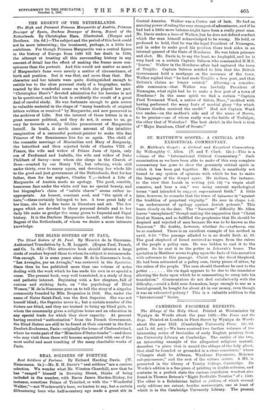THE REGENT OF THE NETHERLANDS.
The High and Puissant Princess Marguerite of Austria, Princess Dowager of Spain, Duchess Dowager of Savoy, Regent of the Netherlands. By Christopher Hare. Illustrated. (Harper and Brothers. 10s. 6d.)—The subject and the period of this book could not be more interesting ; the treatment, perhaps, is a little too ambitions. For though Princess Marguerite was a central figure in the history of Europe from 1480 till her death in 1530, the attempt at treating all this surrounding history in any amount of detail has the effect of making the frame more con- spicuous than the portrait. And this would not matter so much if Marguerite's fame were merely a matter of circumstance, of birth and position. But it was that, and more than that. Her character and her talents were quite distinguished enough to entitle her to the close personal study of a biographer, undis- tracted by the wonderful scene on which she played her part. "Christopher Hare's" devoted admiration for his heroine is not to be questioned, and his book is evidently the result of a great deal of careful study. He was fortunate enough to gain access to valuable material in the shape of "many hundreds of original letters written or received" by Marguerite, and now preserved in the archives of Lille. But the interest of these letters is in a great measure political, and they do not, it seems to us, go very far towards a really lifelike presentment of Marguerite herself. In truth, it needs some amount of the intuitive imagination of a successful portrait-painter to make this fine Princess of the Renaissance live for us again. The child of the romantic marriage of Maximilian and Mary of Burgundy, the betrothed and then rejected bride of Charles VIII. of France, the wife and widow of Prince Juan of Spain, only son of Ferdinand and Isabella, the wife and widow of Duke Philibert of Savoy—near whom she sleeps in the Church of Brou—courted by our Henry VII., but refusing, while still under thirty, ever to marry again, and devoting her whole life to the good and just government of the Netherlands, first for her father, then for her nephew, Charles V. ;—indeed a Life of Marguerite of Austria needs no apology. The good, sensible humorous face under the white coif has no special beauty, and her biographer's claim of "subtle charm" seems rather in- appropriate. An honest, constant soul, and " the spirit of a hero,"—these certainly belonged to her. A true great lady of her time, she had a fine taste in literature and art. The few pages which are devoted to these personal details and to her daily life make us grudge the many given to Imperial and Papal history. It is the Duchess Marguerite herself, rather than the Regent of the Netherlands, of whom we desire a more intimate knowledge.






























































 Previous page
Previous page